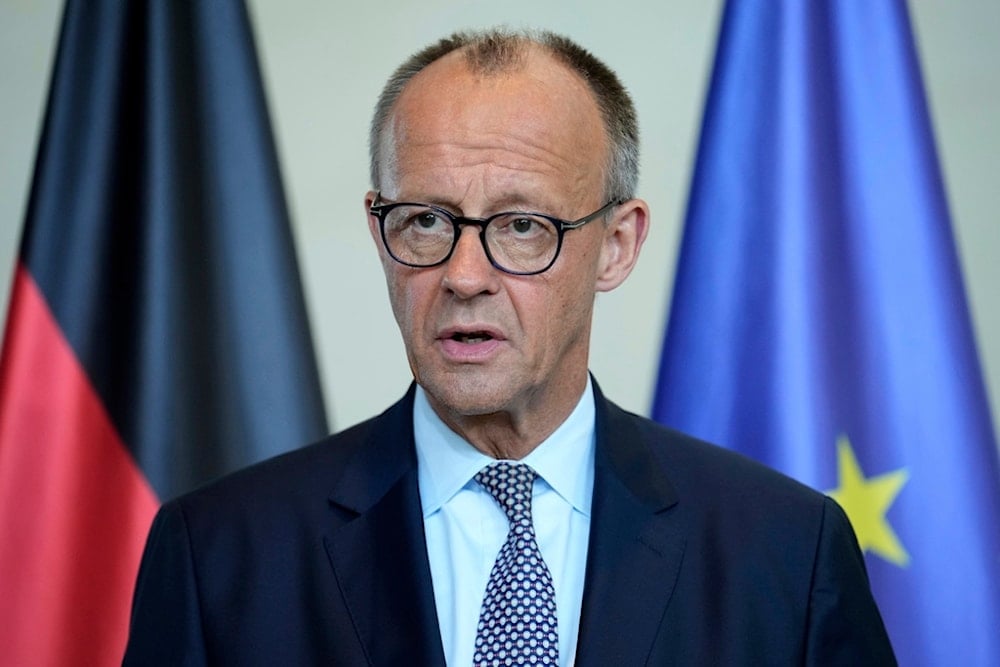Nearly 70% of Germans dissatisfied with Chancellor Merz
A Forsa poll shows 67% of Germans disapprove of Chancellor Friedrich Merz’s performance, with AfD overtaking CDU/CSU as the strongest party.
-

German Chancellor Friedrich Merz attends a joint press statement with Ukrainian President Volodymyr Zelenskyy following talks with European and US leaders in Berlin, Germany, Wednesday, August 13, 2025 (AP)
Nearly 70% of Germans are unhappy with the performance of Chancellor Friedrich Merz, according to a Forsa Institute poll published Tuesday by n-tv and RTL.
The survey found that 67% of respondents disapprove of Merz’s work, while only 30% expressed satisfaction. In a smaller sample, seven out of nine respondents opposed his emphasis on foreign policy. Additionally, 48% of those surveyed said the chancellor is overloaded with responsibilities, and 78% doubted his ability to deliver on campaign promises.
The poll also revealed a shifting political landscape, with the right-wing Alternative for Germany (AfD) emerging as the strongest party at 26% support. Merz’s conservative Christian Democratic Union/Christian Social Union (CDU/CSU) bloc followed closely at 25%, while the Social Democratic Party (SPD) trailed in third place with just 13%.
The survey was conducted between August 12–18 among 2,502 German residents, with a margin of error of 2.5%. A subset of 1,002 respondents provided additional views on Merz’s activities.
Merz became chancellor on May 6 after the second round of parliamentary voting, following February’s snap federal election. His CDU/CSU bloc secured 28.6% of the vote, ahead of the AfD’s record 20.8% and the SPD’s historic low of 16.4%. The CDU/CSU later formed a coalition government with the SPD.
Merz under pressure over German military conscription
Germany’s ruling coalition is preparing for a sharp political dispute over the future of the German military, with Chancellor Friedrich Merz under growing pressure from within his own party, the Christian Democratic Union (CDU), to take a firmer stance on conscription. On August 27, the Cabinet will review the Military Service Modernization Act, a bill designed by Defense Minister Boris Pistorius of the SPD to address the Bundeswehr’s persistent personnel shortages without fully reinstating mandatory service.
Under Pistorius’ proposal, all draft-age men would have to register and undergo screening, with only a targeted number called up for service, while women could volunteer. The government’s aim is to add around 5,000 voluntary soldiers annually for terms of up to 23 months. Crucially, mandatory service would only be activated through a separate parliamentary vote, a safeguard strongly supported by the SPD but questioned by Merz’s conservative allies.
Members of the Christian Democratic Union are pushing for a tougher approach. They want the legislation to include a compulsory service year, offering either military service or civilian roles in areas such as healthcare and education. CDU leaders also oppose the bill’s requirement for a parliamentary vote before activating conscription, arguing it undermines deterrence.
“If conscription is only activated in a heightened military crisis, it becomes a reaction tool rather than a deterrent,” said CDU foreign and defense policy lead Norbert Röttgen. He accused Pistorius of focusing solely on voluntarism without clear targets or an automatic trigger for conscription.
SPD defends voluntary military recruitment model
This position reflects pressure on Merz to back a more assertive defense policy that secures long-term manpower for the Bundeswehr. CDU figures believe that without binding provisions for mandatory service, the military will struggle to meet its operational needs.
The SPD maintains that the Bundeswehr is a “parliamentary army", meaning the legislature, not the executive, must decide on introducing compulsory service. SPD lawmaker Andreas Schwarz argued that the voluntary model is more sustainable, saying, “We want people who want to be there. If you begin with compulsion, you create resistance.”
According to Schwarz, attracting volunteers is more likely to produce trained personnel who commit to longer service terms. The goal, he stressed, is to make service appealing enough to meet recruitment targets without mandatory measures.

 4 Min Read
4 Min Read










